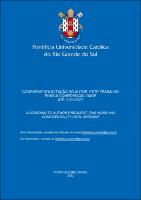| Share record |


|
Please use this identifier to cite or link to this item:
https://tede2.pucrs.br/tede2/handle/tede/10298| Document type: | Dissertação |
| Title: | Preditores de ideação suicida em pessoas com sofrimento psicológico durante os estágios iniciais da covid-19 no Brasil |
| Author: | Castro, Sayra Catalina Coral  |
| Advisor: | Viola, Thiago Wendt |
| Abstract (native): | Este estudo teve como objetivo identificar os principais preditores de ideação suicida (IS) e como se relacionam entre si, em indivíduos em sofrimento psicológico (SP) manifestado por sintomas depressivos, durante a fase inicial da pandemia de COVID-19 no Brasil. Métodos: Os dados foram coletados de participantes brasileiros (n = 8.329) maiores de 15 anos, entre abril e maio de 2020, através de uma pesquisa online. Os participantes responderam a um questionário sobre informações sociodemográficas e uso de substâncias psicoativas. Na sequência, além de sintomas depressivos, foram avaliados sintomas de ansiedade e estresse pós-traumático. Usamos um modelo de regressão logística para identificar preditores significativos de IS entre indivíduos com SP. Adicionalmente, realizamos uma análise de rede parcial regularizada para entender melhor a relação entre esses preditores. Resultados: A prevalência estimada de IS foi de 11,4%. Preditores significativos de IS foram: idade mais jovem (15-24), ser solteiro, baixa renda mensal, desemprego, identificação como LGBTQIA+, transtorno psiquiátrico, sintomas de ansiedade, exposição à violência doméstica e aumento do uso de benzodiazepínicos durante a pandemia. O único fator de proteção significativo para IS foi ser um profissional da saúde. Idade mais jovem, status de solteiro e desemprego foram as variáveis mais fortes na análise da rede. Encontrou-se também fortes associações de rede entre sintomas de ansiedade moderados a graves, aumento do consumo de benzodiazepinas e ter transtornos psiquiátricos. Conclusão: Nosso estudo sugere que, em situações de SP, como a fase inicial da pandemia de COVID-19, populações vulneráveis devem ser identificadas e priorizadas em termos de apoio e prevenção para o risco de suicídio. Reconhecer esses preditores e suas associações entre si pode ajudar na compreensão dos efeitos da pandemia na saúde mental e nas tendências suicidas. |
| Abstract (english): | This study aimed to identify the main predictors of suicidal ideation (SI) and how they are related in individuals undergoing psychological distress (PD) manifested by depressive symptoms, during the initial phase of the COVID-19 pandemic in Brazil. Methods: The data was collected from Brazilian participants (n = 8,329) older than 15 years of age, between April and May 2020, via an online survey. Participants completed a questionnaire on sociodemographic information and use of psychoactive substances. Subsequently, depressive, anxiety and post-traumatic stress symptoms were assessed. We used logistic regression to identify significant predictors of SI among individuals under PD. Participants answered a questionnaire about sociodemographic information and psychoactive substance use. Subsequently, in addition to depressive symptoms, anxiety and post-traumatic stress symptoms were evaluated. We also conducted a regularized partial network analysis to further understand the relationship between these predictors. Results: The estimated prevalence of SI was 11.4%. Significant predictors were: younger age (15-24), being single, low monthly income, unemployment, identifying as LGBTQIA+, having a psychiatric disorder, anxiety symptoms, being exposed to domestic violence, and increased use of benzodiazepines during the pandemic. The only significant protective factor for SI was being a healthcare professional. Younger age, singlehood and unemployment were the strongest variables in the network analysis. There were also strong network associations between moderate to severe anxiety symptoms, increased consumption of benzodiazepines and having psychiatric disorders. Conclusion: Our study suggests that, in situations of PD, such as the early phase of COVID-19 pandemic, vulnerable populations should be identified and prioritized in terms of support and prevention for the risk of suicide. Recognizing these predictors and their associations with each other may help in understanding the effects of the pandemic on mental health and suicidal tendencies. |
| Keywords: | Suicídio COVID-19 Sofrimento Psicológico Brasil Saúde Mental |
| CNPQ Knowledge Areas: | CIENCIAS DA SAUDE::MEDICINA |
| Language: | por |
| Country: | Brasil |
| Publisher: | Pontifícia Universidade Católica do Rio Grande do Sul |
| Institution Acronym: | PUCRS |
| Department: | Escola de Medicina |
| Program: | Programa de Pós-Graduação em Medicina e Ciências da Saúde |
| Access type: | Acesso Aberto |
| Fulltext access restriction: | Trabalho não apresenta restrição para publicação |
| Time to release fulltext: | 60 meses |
| Date to release fulltext: | 09/06/2027 |
| URI: | https://tede2.pucrs.br/tede2/handle/tede/10298 |
| Issue Date: | 24-Feb-2022 |
| Appears in Collections: | Programa de Pós-Graduação em Medicina e Ciências da Saúde |
Files in This Item:
| File | Description | Size | Format | |
|---|---|---|---|---|
| DIS_SAYRA_CATALINA_CORAL_CASTRO_CONFIDENCIAL.pdf | SAYRA_CATALINA_CORAL_CASTRO_DIS | 320.08 kB | Adobe PDF |  Download/Open Preview |
Items in DSpace are protected by copyright, with all rights reserved, unless otherwise indicated.




